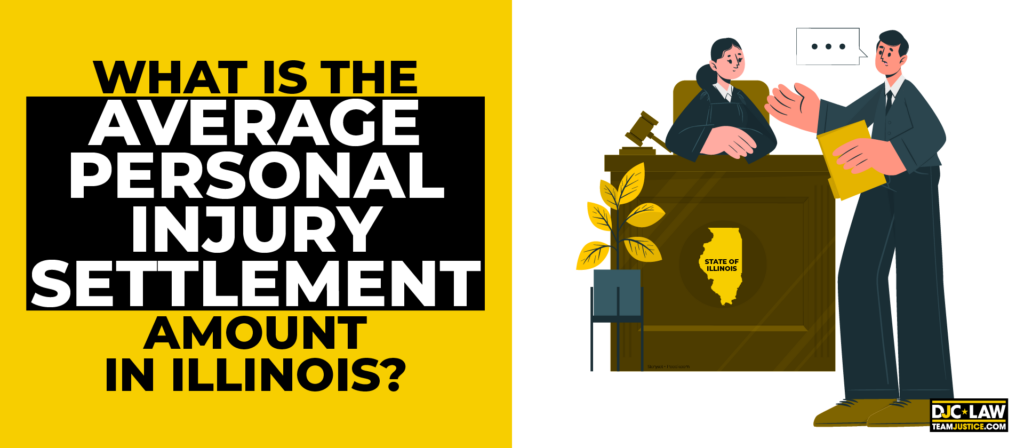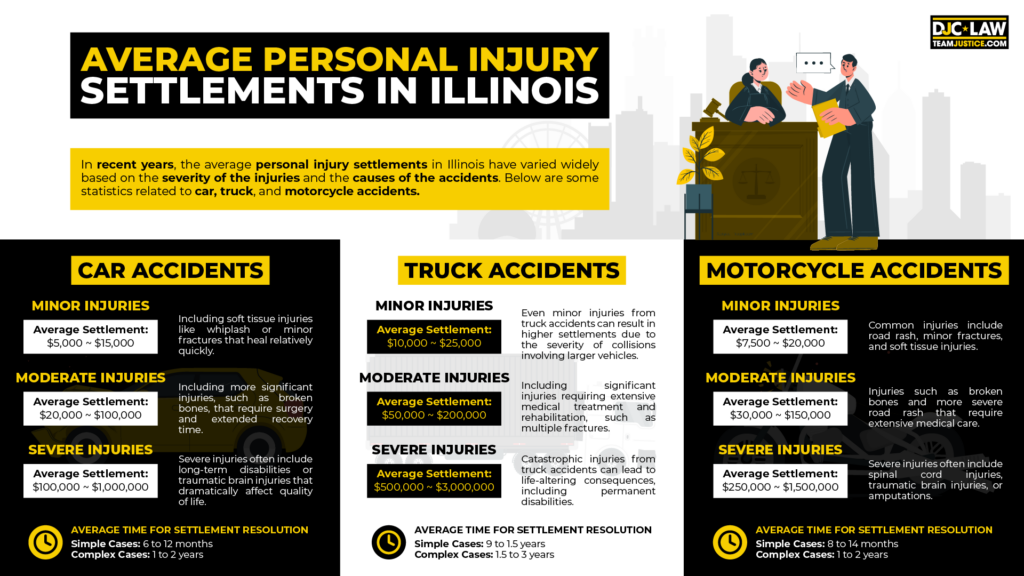
Pursuing your personal injury case during a traumatic time is challenging and chaotic. Hiring a personal injury lawyer in Illinois to fight your corner and hold others to account is the best way to ensure you get the justice you deserve, but what is the average personal injury settlement amount in Illinois?
According to a study from Jury Verdict Research, the average personal injury settlement amount is $26,624 for all cases that go to trial. Furthermore, of all cases that went to trial, 51% of plaintiffs successfully received an award for damages.
The picture is complex and what the average settlement amount looks like depends on a range of factors. In this guide, we discuss how personal injury settlements are evaluated and how to up your chances of receiving damages.
Key Takeaways
- Personal injury settlements in Illinois are calculated by assessing economic and non-economic damages, including medical costs, injury severity, and pain and suffering.
- The average personal injury settlement amount in Illinois is $26,624.
- Different types of damages are assessed differently, whether that’s bodily injury or pain and suffering.
- A good settlement figure comes as close to the forecasted judgment value as possible.
- Beware of legal hurdles in managing personal injury cases, including the two-year statute of limitations, the discovery rule, dealing with court procedures, and comparative fault.
- The standard lawyer fee for personal injury cases in Illinois is 33.3% of the final settlement amount, but this is up for negotiation in some instances.
- Dealing with lowball offers should be done through your lawyer using tactics like providing additional evidence and threatening a lawsuit.
- Hiring an experienced personal injury attorney is essential for getting the most from your settlement amount, advocating for your rights, and taking away the stress of fighting your own case.

How is a Personal Injury Settlement Calculated in Illinois?
Personal injury settlements are valued based on the actual losses and perceived losses the plaintiff has experienced. For example, medical bills and property damage are easy to calculate because these are firm numbers that have been documented. Where issues arise is when someone is permanently disabled or demanding compensation for pain and suffering.
The starting point for any settlement value is the value of evidence. Minimal evidence means minimal compensation. Maximum evidence means maximum compensation. Your case must prove that your losses were a direct result of the other party’s actions or inactions.
Likewise, some cases may also have the issue of comparative negligence. Under Illinois’ comparative negligence laws, both parties could be to blame, impacting your personal settlement amount.
For example, if you were involved in an auto accident and it was proven that the other driver was 80% responsible, your settlement would lose 20% of the value because of comparative negligence. This is a common defense for auto insurers if they believe they can’t get a claim denied.
Now, the majority of settlements are negotiated outside of court. According to the U.S. Department of Justice, only around 5% of personal injury cases go all the way to trial. This is because nobody wants to go to trial. After all, it’s expensive and time-consuming.
However, even if you accept an out-of-court settlement, it’s vital to hire a lawyer because you may receive a lowball offer. If it’s believed you’re desperate for money or want a quick end to your case, the other party may offer you less than your settlement is worth in exchange.
Every case sees different dollar amounts, but the general process of working out what your case is worth doesn’t change. The focus after proving negligence will be on losses, which could include but are not limited to:
- Medical bills
- Property damage
- Pain and suffering
- Lost wages
- Future lost earnings
- Bodily injuries
- Permanent impairment
The degree and severity of your losses act as the centerpiece of determining how much your case could be worth. In the most serious cases, it’s not unheard of for settlements to be worth millions of dollars.
How is Pain and Suffering Calculated in Illinois?
Pain and suffering is the aspect of your case focusing on physical discomfort and emotional trauma. Illinois has no standard formula for working out pain and suffering damages, but according to the Northwestern University School of Law the multiplier method is the most commonly used model, assigning a number to damages.
The multiplier method will assign different multipliers based on how severe a person’s injuries are, from 1.5 to five. For example, if you were involved in an accident that led to a spinal cord injury and total paralysis below the neck, your multiplier would likely be a five.
However, the issue is that pain and suffering are subjective. Someone might shake off an injury with no real issues, whereas another may be traumatized and require long-term treatment for Post-Traumatic Stress Disorder (PTSD).
Pain and suffering calculations are among the most contentious parts of personal injury cases because of the level of subjectivity involved. The other party will attempt to minimize your pain and suffering as much as possible, so hiring a Chicago personal injury lawyer is crucial to ensure this doesn’t happen.
How is a Bodily Injury Settlement Calculated in Illinois?
Bodily injury settlements are calculated based on various factors, including medical expenses, lost income, lost earnings potential, pain and suffering, permanent disability, and comparative fault laws, among other things.
A bodily injury is precisely what it sounds like, comprising everything from your physical injuries to any mental trauma you might have received. Here’s a breakdown of the factors that come into play in your personal injury case:
- Medical Bills – Lawyers begin by examining how much your medical treatment costs you, which includes not only acute care from a hospital but also rehabilitation and any future medical expenses resulting from your injuries.
- Lost Income – How much have you lost because you couldn’t work? This doesn’t just take into account time off but also any potential lost earnings in the future if you’re unable to return to work entirely.
- Pain and Suffering – Calculated using the multiplier method, your pain and suffering considers any non-economic damages.
- Disability/Disfigurement – Any permanent disabilities, including amputations, scars, or impairments, also figure into any compensation award.
- Comparative Fault – Some cases may result in partial blame being assigned to both parties. If this is the case, your compensation award could be reduced. For example, if you were found to be 30% at fault, you’ll see your settlement amount decreased by 30%.
- Insurance Limits – In certain types of cases, including auto accidents, the limits on your insurance policy might come into play. If you’ve got a settlement cap, this could stop you from receiving more than the maximum amount.
Note that you may also be able to claim damages suffered by your wife/husband or any other family members. This often applies to severe injuries and can include loss of affection, companionship, and any other monetary losses they experience due to caring for you.
What are the Average Car Accident Settlement Amounts in Illinois?
Average car accident settlement amounts in Chicago range from $25,000 to $29,000, assuming moderate injuries. Serious incapacitating injuries may lead to average settlements surpassing $100,000.
Unfortunately, these are only the averages. Car accidents are so common that there’s tremendous variation in what you could receive.
What are the Average Truck Accident Settlement Amounts in Illinois?
Truck accident settlements in Illinois are substantially higher than automobile settlements because of the higher severity of injuries in accidents involving trucks. Generally, the average truck accident settlement is $427,336 (Truck Accident Research, 2021).
Due to the size of these vehicles, the chances of devastating injuries occurring are far higher. It’s also why motor carriers are usually required to have at least $1 million in liability insurance coverage.
Here’s a breakdown of some averages for different injuries resulting from truck accidents:
- Foot – $559,803
- Leg – $520,204
- Organ – $519,462
- Broken Bones – $518,143
- Facial – $476,563
- Hand – $446,206
- Back – $368,237
- Spinal Cord – $417,950
- Wrongful Death – $607,532
Why are these amounts so much higher? Injuries caused by truck accidents are usually more severe than those caused by other vehicles. So, a foot or leg injury is often life-changing.
What are the Average Motorcycle Accident Settlement Amounts in Illinois?
Motorcycle accident settlements often result in high payouts due to the increased likelihood of severe injuries. According to a study conducted by Gitnux, the average jury award for motorcycle accidents is $73,700, while bodily injury claims made through insurers average $7,854..
However, these are only averages, and motorcycle settlements see substantial variation. The type of motorcycle plays an enormous role in settlement amounts, with touring and Supersport models receiving higher settlements than, say, scooters and sports bikes.
Other Personal Injury Average Settlements
Personal injury is a vast category, taking in a wide range of cases. Naturally, averages change based on the type of case. Here are some ballpark figures for what different case types could yield:
- Slip and Fall – $15,000 – $45,000
- Product Liability – $100,000+
- Medical Malpractice – $679,000
- Workers’ Compensation – $2,000 – $40,000
- Dog Bite – $30,000
Despite these averages, your actual settlement award will depend on the severity of your injuries and any other losses.
What is a Good Settlement Figure?
Very good settlement figures would be getting close to the projected judgment value of a personal injury case. The goal for any lawyer will be to balance the risk of going to trial and the issues of liability with maximizing the compensation award.
For example, if your Chicago personal injury attorney predicts that your case could be worth $500,000 if you go to court and the other party has offered a settlement of $480,000, this would be considered a great settlement.
Why? For one, going to a trial could take years for an extra $20,000. Moreover, your lawyer may raise concerns over comparative liability, which could result in you receiving about the same as the settlement or even less.
Plus, it’s worth mentioning that many plaintiffs would rather accept a slightly smaller settlement to avoid the stress and hassle of going to court in the first place.
Does Illinois Have a Cap on Personal Injury Damages?
Illinois places no cap on how much in damages you could receive from your personal injury case. Many states have enacted damage caps to outline the maximum amount you can claim, regardless of the extent of your injuries, but this isn’t the case for Illinois.
In the past few years, states have focused on limiting how much plaintiffs can receive in non-economic damages. The federal government also has a $250,000 damage cap for non-economic damages in medical malpractice claims.
In 2005, Illinois attempted to enact a damage cap on non-economic losses in medical malpractice cases. Instantly, this law was challenged and overturned in 2010 because it was found to violate The Prairie State’s constitution. Since then, no further attempts to bring damage caps for any personal injury case have succeeded.
How Long Does a Personal Injury Settlement Take in Illinois?
It depends on your case. Some personal injury cases take a year or longer to obtain a settlement, especially if the other party refuses to negotiate a fair settlement. However, in Illinois, insurance companies must disburse any settlement amount within 30 days of receiving their signed release.
The time it takes to receive a personal injury settlement will depend ultimately on two things:
- How clear-cut the case is. For example, if it’s obvious who was at fault and damages are easy to assess, your settlement could be ready in a matter of weeks.
- Who was at fault? Arguments over who’s liable for the accident can cause settlements to drag on.
Generally, you’re likelier to see marathon cases if substantial amounts are involved. An insurer isn’t wasting time going to court over a $5,000 settlement, but they’ll fight tooth and nail over a $5,000,000 settlement.
How Long Does it Take to Get a Settlement After an Accident?
Receiving a settlement after an accident means waiting for 30 days once the insurance company receives its signed release. However, this assumes that the insurer offers a settlement that you agree to. Like all personal injury cases, if the case is contentious, there’s no telling how long your case could last.
Illinois has a statute of limitations on how long you have to file your personal injury case, but there are no limits on how long parties have to resolve a case. This is why you sometimes see cases lasting for years before the victim receives their just compensation.
Understanding Time Limits for Filing a Claim
Always file your claim as soon as possible in the aftermath of an incident to ensure that your settlement is obtained promptly. The problem is that the personal injury statute of limitations in Illinois has a relatively short two-year limit on filing personal injury cases, with almost no exceptions.
Fail to file your case in time, and you lose your right to claim for damages. Only in some scenarios are you entitled to extend or freeze the statute of limitations, including:
- If the victim is under 18 at the time.
- If the responsible party leaves the state.
- If the victim is mentally handicapped and doesn’t understand their legal rights.
What are the Challenges of Personal Injury Damages in Illinois?
Maximizing your compensation award is the main challenge of getting personal injury damages in Illinois. Most cases are relatively simple, with your lawyer able to prove that you’re entitled to compensation. The difficulty is deciding on a suitable amount that both parties will agree to without going to court.
Your lawyer doesn’t want to go to court because it’s fraught with risk. The plaintiff often has to sit down for a stressful cross-examination, and there’s always the risk that you won’t get the judgment you want. Plus, the court systems are clogged, meaning obtaining a trial date in good order could be harder than you think.
What are Common Legal Hurdles in Illinois?
The personal injury claims process isn’t too tricky if you work with an experienced Illinois personal injury attorney. However, there are some legal hurdles to be aware of when consulting a lawyer and filing your case, including:
- Statute of Limitations – The statute of limitations is two years from the date of your injury. However, the discovery rule comes into effect if you’re filing a medical malpractice case. This is two years from when you discovered or should have discovered your injury, but this is capped at four years.
- Comparative Fault – Under Illinois’ modified comparative fault rule, blame can be assigned to each party. The problem is you can’t receive any damages unless you were found to be less than 50% responsible for the incident, regardless of your injuries and losses. This is a big issue in auto accidents due to the at-fault laws in Illinois.
- Proving Negligence – Your lawyer must prove that the other party had a duty of care, that they breached that duty of care, and that you sustained losses as a result.
- Court Procedures – If your case must go to trial, you’ll face the challenge of navigating Illinois court procedures. This includes building a case with evidence and making legal arguments. Plus, trials aren’t fast processes.
Generally, you’re likelier to have fewer problems if you have as much evidence as possible. This is why it’s essential to keep organized records of everything relating to your accident, injuries, and losses.
How to Address Lowball Settlement Offers
Addressing lowball settlement offers gives you several options, including gathering more evidence, writing a detailed demand letter, or filing a lawsuit and threatening to take the case to court.
Lowball offers are made for a reason – and not because the insurer or other party are good people. Some of the reasons they do this include:
- They believe you are desperate.
- They don’t believe you know your rights.
- They believe you are partly liable for the accident.
- They don’t have all the information about your losses.
Ultimately, the goal for any defending party is to pay as little as possible. This is why auto insurance companies employ teams of experienced adjusters to get claims denied or to prove that the claimant was partially responsible.
There are several avenues you can take to confront a lowball offer, including:
- Reject the settlement offer.
- Gather more evidence for your claim.
- Write a detailed demand letter.
- Enter settlement negotiations.
- Take your case to trial.
But how do you know whether you’re receiving a lowball offer if you don’t have any legal experience? You don’t, and that’s why the biggest mistake victims can make is attempting to handle things themselves. Lawyers are there to advise you and maximize your compensation award. They know all the tactics people try to lower settlement amounts and have the expertise to counter them.
What Percentage Does a Lawyer Get in a Settlement Case in Illinois?
Typically, an Illinois personal injury lawyer is entitled to 33.3% of any awarded settlement plus costs like retainer fees. Some lawyers may charge up to 40%. While this may sound like a lot, it ignores what a lawyer brings to the table and how much more you can receive by employing a lawyer in the first place.
Note that you don’t have to pay anything upfront to hire an attorney. Today, lawyers take their fees from settlement amounts, which is why attorneys are so motivated to win your case. If you don’t win your case and receive nothing, you won’t have a substantial legal debt to pay. That’s why it’s always worth pursuing your personal injury claim.
What are the Factors Affecting Lawyer Fees in Settlements?
No two personal injury cases are the same, so lawyers often offer flexibility in how much they’ll take for their services. Aspects like complexity, the work required, and how long the case lasts will affect how much you can expect to pay your lawyer after receiving a settlement.
Let’s go into some detail on each of the key factors:
- Case Complexity – More complex cases mean more resources needed to fight your case. This is especially true if you’ve suffered devastating or you’re pursuing a medical malpractice case. In these cases, your lawyer will usually charge more for their services.
- Work Required – It goes without saying that if a lawyer has to conduct extra investigative work, they’ll have to invest more time into your case. More hours means they’ll take a higher percentage.
- Case Time – The legal process swallows money like a pit in the earth. Naturally, longer cases will increase the costs of pursuing your case, including court and filing fees. If a case begins to drag, your personal injury lawyer may take a higher percentage.
- Settlement Amount – Average fee percentages don’t account for the nuances of different settlement amounts. Most lawyers offer some flexibility for high-value cases. For example, you may see a smaller percentage if your case is worth a few million dollars compared to a few thousand dollars.
Of course, every Illinois law firm differs in its approach to fees. Don’t be afraid to talk to your attorney about their fee structure during your initial case consultation.
What are the Benefits of Hiring a Personal Injury Lawyer?
Hiring a Chicago personal injury lawyer is your best chance of getting the settlement amount you deserve. Most people don’t know about the claims process or the underhand strategies other attorneys and insurers might use to get them to accept less than they deserve.
It’s a proven fact that people who file their own cases receive substantially less in settlement monies than those who hire an attorney, even after fees are accounted for. So, why should you hire an Illinois attorney?
Advocating for Your Rights
Legal rights are complicated, and most people are unaware of them. Not knowing your rights or the legal system as a whole means you’re vulnerable to pitfalls that could reduce your settlement amount or even stop you from claiming entirely.
Your attorney ensures you don’t fall victim to any of these things because they know your rights. They’re your advocate who takes the strain at every step in the process while you concentrate on rehabilitation and moving on with your life.
Negotiating Settlement Offers
How do you know if you’re receiving a fair settlement offer? The chances are you don’t because of the difficulties associated with calculating damages in the first place, especially when considering non-economic damages.
Your lawyer knows what your case is worth and will fight the other party every step of the way to ensure you get every dollar that you deserve.
Filing or Threatening a Personal Injury Lawsuit
It’s not uncommon for insurers and defendants to offer lowball settlements in an attempt to intimidate plaintiffs into avoiding a trial and ending their action. Nobody wants to go to court, but it’s vital to always keep this option in your locker.
Navigating Illinois court procedures is complex and most people don’t want the hassle. With an attorney by your side, you have an experienced professional who can file your case and lead you through the process with minimal stress.



